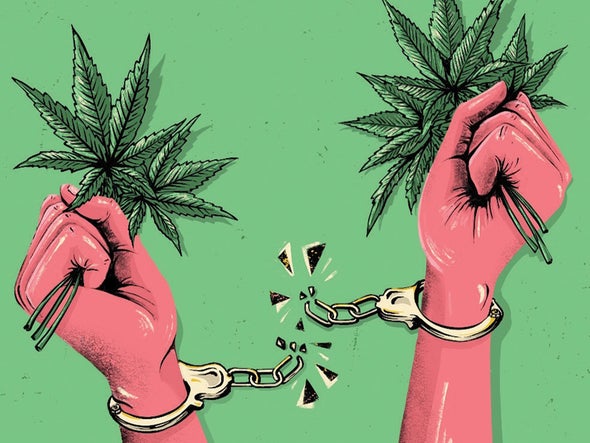Public opinion has swung rapidly in favor of marijuana legalization, and there is growing discontent among the public and policy makers with the criminalization of low-level drug offenses. As public health researchers who have studied marijuana, alcohol and tobacco policies, we strongly favor decriminalization but are cautious about legalization. Decriminalization and legalization are separate policies relating to the removal of criminal penalties for use and the establishment of legal markets, respectively. Criminalization of marijuana harms people, but the history of legal alcohol and tobacco shows that public health suffers when profits take priority over the public good. Ideal cannabis policies must take into account just and equitable criminal policy, individual liberty and strong regulation.
Our research has shown that decriminalization and legalization can have different outcomes. For decades possession of a small amount of marijuana could lead to large fines and jail time, and many in our field have long thought these penalties are disproportionate to the crime.
In 2009 Massachusetts began reducing penalties such that possession of a small amount of marijuana was akin to a traffic violation. Many states followed. This is decriminalization: fewer or no penalties but not necessarily with laws or infrastructure supporting legal sales. People of color are much more likely to be arrested for possession than white people, and this disparity has worsened in states that have not decriminalized or legalized cannabis.
Yet legalization doesn’t completely solve the criminalization problem because people can still break the law through underage possession, illegal sales and other violations. Our research has shown that in states that legalized marijuana and implemented age-restricted commercial cannabis markets, there was no immediate reduction in arrests of people under the age of 21. But in states that decriminalized cannabis possession without fully legalizing it, there were reductions in arrest rates of minors and in enforcement disparities. This may be because states that focused primarily on creating legal markets paid less attention to the details of decriminalization policy, whereas states where decriminalization was the main goal designed legislation for maximal impact on criminal consequences for people of all ages.
Even in states that restrict cannabis use only through civil penalties and fines, poor people and minorities bear the brunt of these consequences. States should remove all penalties for carrying small amounts of cannabis, essentially legalizing possession for personal use but not sales or distribution. We also think states should expunge the criminal records of people who were convicted of possession of small amounts of marijuana and even of low-level sales.
Our current drug policy for marijuana makes little sense. Cannabis rarely ever kills anyone, unlike alcohol and other drugs. And deaths from the latter two are rising. We think the individual choice and freedom stemming from a more liberal cannabis policy could contribute to the common good. Research from Uruguay, Canada and the U.S. suggests that age-restricted legalization of marijuana sales does not lead to large increases in cannabis use among youth, a primary concern of prohibition advocates.
Sound legislation must consider the harms associated with heavy cannabis use, however. Cannabis is an addictive substance. As with alcohol and other drugs, a small percentage of users consume most of the cannabis produced. Cannabis acutely affects learning and memory and therefore overall functioning and productivity. Over time these effects can worsen work and educational outcomes, which in turn impact health and life expectancy. Thus, laissez-faire legalization with few regulations is harmful. History offers multiple examples of societal harm from lax regulation, including of the tobacco, alcohol and pharmaceutical markets.
We urge policy makers to alleviate the suffering caused by unnecessary and ineffective criminal penalties for marijuana violations. They must limit the power and influence of the industry through taxes, restrictions on advertising and promotion, and a purchase age of 21. Decades of research show that such actions can reduce the harms associated with addictive substances. Failure to take them will result in a new addiction industry in the U.S.



